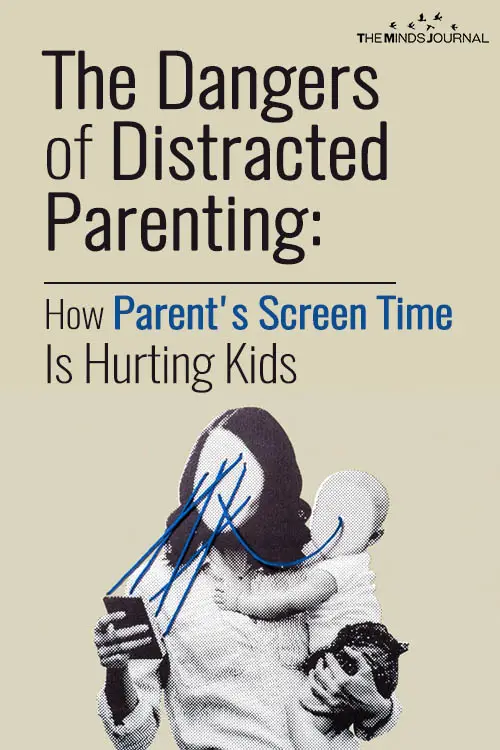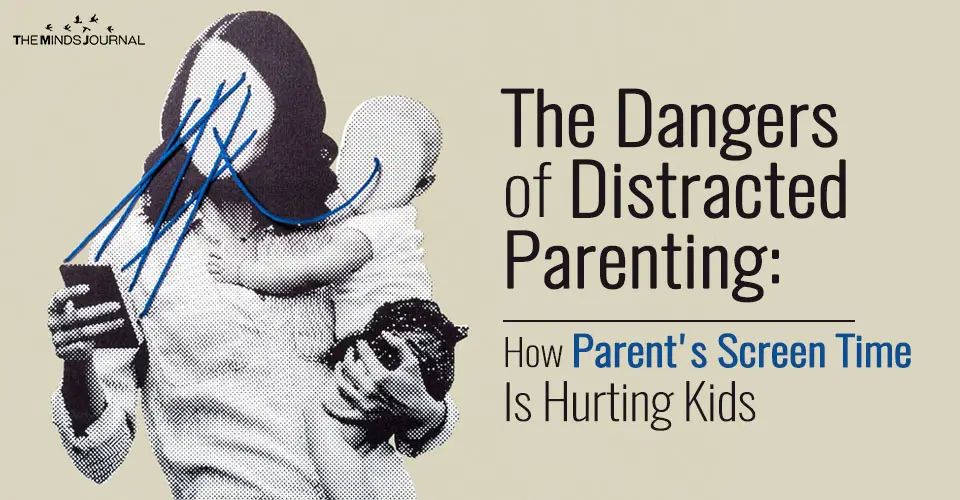Distracted parenting: How too much of social media and screen time is hurting kids and hindering their overall development.
The question is, are you overdoing it?
Why Parents Really Need to Put Down Their Phones
Parents on devices distress children and reduce their resilience.
Young children are closely attuned to their parents’ attention. They depend on that attention for their survival, of course, but also for their social and emotional development.
Several recent research studies show the damage parents can do when they’re physically present, but distracted and less responsive because they’re attending to their smartphones.
Study #1: Moms on cellphones have children who are more negative and less resilient.
In one study, published in Developmental Science, infants and toddlers from seven months to two years old were assessed for temperament, social engagement, exploration, and post-disruption reunion and recovery. The researchers reported that children expressed more distress, and were less likely to explore their environment when their mothers were using their cell phones.
The young children whose mothers reported greater habitual use of mobile devices outside the lab showed more negativity, and less emotional recovery when their mothers did turn off their phones. The researchers concluded, “Like other forms of maternal withdrawal and unresponsiveness, mobile-device use can have a negative impact on infant social-emotional functioning and parent-child interactions.”
Study #2. Children feel unimportant, and have to compete with smartphones for parents’ attention.
In a large international study of six thousand eight- to thirteen-year-old children, 32 percent reported feeling “unimportant” when their parents use their cellphones during meals, conversations, or other family times. The children reported competing with technology for their parents’ attention. Over half of the children in the study said their parents spend too much time on their phones.
Study #3. Distracted parental attention harms children’s social/emotional development.
Yet another major study, this one with rats, also showed the ways distracted parental attention harms babies’ development, especially their ability to process a pleasure and engage in social activity. Rat pups raised by distracted mothers were otherwise given what they needed to thrive. They achieved normal weight, and they spent the same amount of time with their mothers as the babies raised in the normal environment. The researchers observed, however, that adolescent offspring who had been raised by distracted mothers ate less sugar solution and spent less time playing and chasing their peers than did rats raised by undistracted mothers.
What differed was the type of attention they received from their mothers. Distracted mothers tended to be less predictable, less reliable, and less attentive. The researchers concluded that fragmented and chaotic maternal care disrupts brain development, which can lead to emotional disorders later in life. “We need predictability and consistency for the emotional system to develop,” they write. The same researchers are now applying their findings with rats in studies of humans.
Study #4. Cellphone use interferes with healthy parenting.
A pediatrician and her colleagues became sufficiently concerned about parents using cellphones and ignoring their children that they set up a study to assess the prevalence of this behavior at fast-food restaurants. Many parents pulled out a device immediately on sitting down. Most used it during the meal, often appearing more absorbed in their smartphones than the kids.
“At the end of the day, the most overwhelming key to a child’s success is the positive involvement of parents.” – Caitlyn Jenner
These researchers found that kids whose parents were absorbed in their devices were more likely to act silly or be noisy. Many parents on cell phones were irritable and impatient, which only led to worse behavior. They observed that cellphone use interferes with healthy parenting. Children, they write, “learn by watching us how to have a conversation, how to read other people’s facial expressions. And if that’s not happening, children are missing out on important development milestones.”
Study #5. Kids feel sad, mad, angry, and lonely when parents use cellphones.
Yet another researcher interviewed a thousand children between the ages of four and eighteen, asking them about their parents’ use of mobile devices. She reported that many of the children described themselves as “sad, mad, angry, and lonely” when their parents were on their devices. Several young children reported damaging or hiding their parents’ cellphones.
This was an interview study, so the researcher couldn’t determine exactly how the digital disconnections might affect a child in the long term. But she learned enough to conclude that parents should think twice before picking up a mobile device when they’re with their kids. She said, “We are behaving in ways that certainly tell children they don’t matter, they’re not interesting to us, they’re not as compelling as anybody, anything, any ping that may interrupt our time with them.”
Ultimately, kids thrive when they receive consistent, dependable, focused, loving attention. Using a smartphone when you’re with a child is a form of psychological withdrawal and non-responsiveness. We’re not talking about staying off your phone 100 percent of the time—more like 90 percent. It’s okay to answer an urgent text or make a quick call, especially if it includes your child.
But as much as possible, when you’re with your child, be with them. Put away that phone and other electronic devices. Enjoy the brief moment you have to help your child grow into the delightful adult you hope they will become.
As a parent, you will obviously want only the best for your child and would want them to flourish in every aspect. One of the best ways you can do that is by reducing the time you spend on your phone, as it is not going to help both of you in any way. Distracted parenting can only have negative effects on your child, and you wouldn’t want that, would you?
If you want to know more why parents need to put down their phones, watch this video:
Written By Dona Matthews Ph.D.
Originally Appeared In Psychology Today
You May Also Like:
Modern Parenting May Hinder Brain Development – Studies Suggest
13 Alternative Strategies To Discipline Your Child, Than With a Simple NO
Parenting Challenges In The Digital Age
New Parents, Listen Up: Passion and Parenting Can Co-Exist









Leave a Reply
You must be logged in to post a comment.